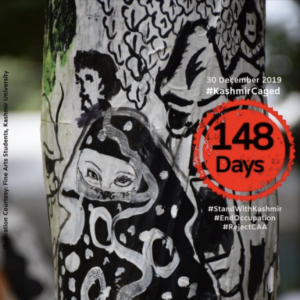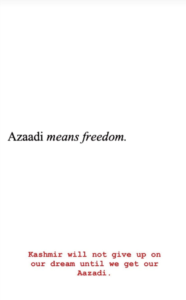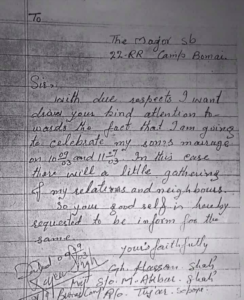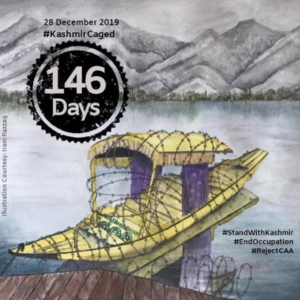
December 30th, 2019

December 30th, 2019


A vignette from the occupation of Kashmir as told by Aahil Asif:
Widow of Palaquin .
Picked hours after he brought his bride home Tahir’s remains were sent home in a polybag. The brutal killing gave Kashmir many sleepless nights. Thirteen years later, Ubeer Naqushbandi visits the family still in pursuit of justice
In autumn 2003, Ghulam Hassan Makhdoomi, 60, who taught at Falah-e-Aam school in restive Tujjar village, Sopore, was returning home happy. He had just confirmed his eldest son’s marriage with his deceased brother’s daughter Afroza. On his way home Makhdoomi was busy making plans, calculating the cost of marriage and other expenses. But first things first: he has to seek permission from Major Rajinder Singh aka Major Raju, a dreaded name in Tujjar who commanded army’s 22 Rashtriya Rifles. “It was an unsaid rule in Tujjar. No marriage ceremony would take place without seeking a written permission from Major Raju,” recalls frail Makhdoomi.
Once home, Makhdoomi sat down, took a pen and paper and began: To the Major Sahab, 22-RR Camp Bomai. Makhdoomi finished the application informing Major Sahab “that I am going to celebrate my son’s marriage on 10 and 11 September 2003. In this regard a little gathering will be there of my relations and neighbours.”
Next day Makhdoomi bought a box-of-sweets and went to Bomai camp to seek formal permission army Major. “He granted permission instantly,” recalls Makhdoomi. Thus began the celebration in Makhdoomi’s house. Entire neighbourhood resonated with songs praising innocence of the groom, and bride’s beauty.
On September 11, 2003, around 4 PM, Makhdoomi’s son Tahir left for his bride’s house. By mid-night Tahir was home along with Afroza, his bride. At 4 AM, when everybody was asleep after a hectic day, a loud bang on the front door shook everybody. “It was Major Raju along with his men at my door,” recalls Makhdoomi. “He straightaway asked for my son.”
Sensing trouble Makhdoomi pleaded with Major to leave his son alone as it was his wedding night, but he did not listen. “I just want to have a little chat with him,” the Major had told Makhdoomi. He assured Makhdoomi that Tahir will be back by 7 AM. With no other option left Makhdoomi let Major Raju take Tahir with him. Before Tahir left, Afroza his bride of just few hours, had one last look at her husband and then held her mehandi (henna) hands towards Major Raju. “She couldn’t say anything,” recalls Makhdoomi. “He (Tahir) was taken in his ceremonial attire.”
The moment Major Raju took Tahir, Makhdoomi knew something bad is about to happen, it was bad omen for the helpless father. Instantly celebrations turned into gloom. When Tahir did not return at 7 AM as promised by Major Raju, Makhdoomi along with a few neighbours and relatives went to Bomai camp to seek his son’s whereabouts. “Major Raju sent us back assuring that Tahir is fine and will be home soon,” recalls Makhdoomi.
For next two days Makhdoomi and his relatives waited in vain, but there was no news about Tahir. On the third day Major Raju knocked at Makhdoomi’s door once again, this time with news. “Your son was killed in an explosion while heading towards a hideout in Ballkul jungles,” Makhdoomi remembers Major Raju telling him without a hint of emotions or remorse. It was heartbreaking for the family, nobody could control his emotions. Tahir’s mother, upon hearing her son’s death, raised hue and cry, and confronted Major Raju. “He (Major Raju) took a spade and tried to hit my wife. I grabbed him (Major Raju) by his collar and told him ‘Saale Tu Kyun Nahin Maraa’(why didn’t you too die),” recalls Makhdoomi.
A day earlier, villagers had heard several gunshots in the nearby jungle, but nobody linked it with Tahir. “We thought there might be some gunfight,” recalls Makhdoomi. As news of Tahir’s death spread in adjoining villages, people started pouring in Tujjar, from where a huge procession headed towards Balkul jungle. “Army didn’t allow us to visit the spot where Major Raju said Tahir was killed,” says Makhdoomi. “But people were adamant. We demanded Tahir’s body.”
Makhdoomi claims that Major Raju had already tortured Tahir to death inside custody. “He staged the entire thing to make it look like an accident,” alleges Makhdoomi. “How come only Tahir was killed in the blast while army men accompanying him escaped unhurt?” asks Makhdoomi. “Not a single army man had even a bruise.” When the demand for handing over Tahir’s body grew stronger Major Raju, along with his men, came to Makhdoomi’s home and handed him a polythene bag. “It contained a portion of Tahir’s mangled leg and a few other pieces of meat,” says Makhdoomi amid sobs. “That was all left of Tahir. I cannot forget that gruesome moment for the rest of my life. It has killed me.”
According to villagers, a few days before Tahir was taken into custody, Makhdoomi had an argument with Major Raju. “He had forcibly taken villagers to Bomai camp for manual labour,” recalls Makhdoomi. Major Raju ordered everyone to cut the grass from camp’s lawn. “Nobody dared to say no to Major Raju. But I refused,” say Makhdoomi. “Major warned me, ‘iska anjaam theek nahi hoga’ (there will be repercussions for this),” recalls Makhdoomi, an Imam of Jamia Masjid Nathipora, who taught at a Jama’at-e-Islami run school. “My association with Jama’at School irked Major.”
Makhdoomi blames: Intikaam ki bunyaad pee Tahir ko mara (he killed my son just to take revenge from me). Next day Tahir’s leg was buried in local graveyard outside Tujjar Sharief shrine.
After the news of Tahir’s brutal killing became public entire Kashmir witnessed protests. Tahir’s college in Sopore, where he was pursuing graduation as first year student, remained closed for one month.
A few days later, Mufti Sayeed, the then CM, and PDP president Mehbooba Mufti visited Makhdoomi’s house and assured action against the accused Major Raju. “But nothing has happened so far,” Makhdoomi says. “I then took up my son’s case on my own to get him punished.” But Major Raju was in no mood to let Makhdoomi breath freely even after Tahir’s brutal killing. “He started threatening me of dire consequences if I don’t stop pursuing Tahir’s case,” says Makhdoomi. “But I had made up my mind.” Then, alleges Makhdoomi, an agitated Major Raju started harassing Tahir’s younger brother Tariq. “He would pick him on one pretext or another and torture him. It was all to keep him from pursuing the case,” says Makhdoomi.
While trying to bring Tahir’s killers to justice Makhdoomi had many other issues looking at his face back home. His wife Haleema was a living corpse ever since she saw Tahir’s mangled remains. Tahir’s wife Afroza was no better. “She was grieving for her son and at the same time worried about Afroza’s future,” says Makhdoomi. After consulting Afroza’s brothers Makhdoomi married her to his younger son Tariq in a simple ceremony. But this did not help change Haleema’s condition. “Her eyesight was fading, she had turned into a loner,” says Makhdoomi.
After Tahir’s killing an FIR was lodged in Sopore police station by Makhdoomi. Subsequently, the case was heard in Tangmarg Lower Court, Dangiwacha Lower Court and Sopore Lower Court. “I didn’t let this case get buried under official files,” says Makhdoomi. But Makhdoomi’s intense perusal was making Major Raju restless. And finally one day Major Raju came knocking at Makhdoomi’s door, for the third time. “He had come to apologize and an offer of Rs 7 lakh,” says Makhdoomi. “Khoon ka sodha karna chata tha (He was putting a price of my son’s life),” says Makhdoomi. Mufti Muzzafar, Makhdoomi’s brother, who was there that time, told Major Raju that if you want to sincerely apologize then kill yourself. “He left without saying a word,” says Makhdoomi.
After a few days, Major Raju once again resorted to his earlier tactics: picking up, harassing and torturing Tahir’s younger brother Tariq, says Makhdoomi. “In between he raised the blood money to Rs 12 lakh. But I stuck to my demand: kill yourself,” says Makhdoomi. In 2006, State Human Rights Commission (SHRC) took cognizance of the case and ordered an inquiry. However, despite SHRC’s intervention Major Raju was transferred to Watlab area of Bandipora district. In 2014, the case was sent to Home Ministry. “I am yet to hear from them,” says Makhdoomi.
~Retrieves
I hear waters are frozen in the Dal,
unable to bear the cold, it has taken to ice.
Children free in spirit skidding on it,
indifferent of uncertainties around.
The Chillai-Kalan arriving early this year,
for it must shoulder the pain of its keepers
in their blockade.
I hear people are still under siege,
cut off from each other,
Like the water in the taps, solid and clogged
yet enduring the anguish in peace.
Little does the besieger know,
one day the sun will come out in a flash
melting away frosts from the lives of all folks.
I hear that people are numb, frightened
by the scavengers gazing at them, day and night
Like the ice, they are waiting patiently
for the winter to thaw
For they have their resilience,
unmatched,
till the besieger is tired of the siege.
I hear that this year is approaching its end,
leaving the memories of yore for eternity.
Time, never hostage to anyone mighty or exposed,
shall one day set you free from the shackles of woe
The ice will melt, rivers gush and fields float
Hold on to hope, until freedom comes!
©Mudasir Firdosi
Another informative video about the occupation of Kashmir from Toronto For Kashmir:
"Only Death Can Unite Us Now" – Sister of Murdered Innocent Youth
"Only Death Can Unite Us Now" – Sister of Murdered Innocent YouthKashmiris have suffered in this Vale which was once known as paradise on earth. Due to the unrest, turmoil, and cycle of violence, people have lost their kith and kin; and as such, Kashmir has suffered a lot. This valley has seen plenty of untold stories of mass violations of human rights committed by the Indian Army.Since 1989, the people of Kashmir have been killed, tortured, humiliated, and injured. Thousands of innocent people have lost their lives due to the cycle of violence prevalent in Kashmir. Many have lost their beloved children, daughters, sisters, mothers, and some women have lost their beloved husbands, who were only the source to care for them. The fundamental rights of the people have been encroached and curtailed. The region has been suppressed due to misuse of the armed forces. It is pertinent to mention here that no democracy can be successful where draconian and inhuman laws are prevailing. Democracy can only survive when the dignity of every individual will be respected and safeguarded. Here are tears in every mother’s eyes that have lost their beloved children. Everybody here hates violence and is ready to see peaceful Kashmir without any conflict and human rights violations, may this dream of so many become reality. End the occupation, justice for Kashmir and Kashmiris.—————–Instagram: instagram.com/torontoforkashmirTwitter: twitter.com/toronto4kashmir#TorontoForKashmir #Kashmir #HumanRights #EndTheOccupation #KashmirChained #Kashmiris #KashmirBleeds #FreeKashmir #KashmirIssue #KashmirStillUnderSiege #PrayForKashmir #RedForKashmir #StandWithKashmir #ForKashmir #Kashmiri #KashmirDiaries #VoiceOfKashmir #SrinagarDiaries #Kashmiriyat #ResistToExist #KashmirLife #Kasheer #KashmirSOS #LetKashmirSpeak #Article370 #srinagar #anantnag #bandipora #baramulla #WithKashmir
Posted by Toronto For Kashmir on Friday, December 27, 2019
Documenting Oppression Against Muslims (DOAM) has been shadow banned from Facebook for a week which means their posts will not appear in our newsfeeds. It’s hard to imagine what could possibly have offended the censors since they present news in a cogent but never inflammatory way. You could show support for their important work by going directly to their wall to like & share their posts.
One can respect Mehdi Hasan’s skewering style of debating Erik Prince but still deplore that he never brought up the illegitimacy of the US-NATO war in Afghanistan. The issue isn’t primarily how they execute that barbaric war, whether with government &/or mercenary forces, but that they have no right whatsoever to be there.
Demand the immediate, unconditional withdrawal of all US-NATO forces & mercenaries from Afghanistan.
This is an interesting opinion piece except for the writer’s assumption that Western politicians & business leaders were misguided in their fawning over Modi–as much Obama as Trump, as much Zuckerberg as Gates, as much Western figures as the rulers of the UAE & New Zealand prime minister Jacinda Ardern. They all know more about Modi’s politics than we do since they have agencies that analyze his actions. The fawning is about investments & trade, including government military alliances with Modi in the South China Sea. They should not be left off the hook for their deep connections to Indian fascism but indicted right along with Modi & Shah.
https://theweek.com/articles/884478/west-profoundly-wrong-about-modi?

In September 2019, ten labor union federations in India called for a one-day general strike on January 8th, 2020. Millions of workers, farmers, youth will be involved in protest against neoliberal policies, including privatization of public enterprises (like rail & mining). The call was made after the lockdown of Kashmir & at the beginning of attacks on Indian Muslims. Those who go uncritically rah-rah for the unions need to take a close look at this call. With nearly a million troops in Kashmir, the attacks on Indian Muslims, caste oppression, major advances in neoliberal policies, & giant steps toward fascism, why just a one day strike? Why not take those millions out & shut the country down until all their economic & political demands have been met since the three previous one & two day strikes under the Modi-led BJP government haven’t altered a single thing?
There’s a second whopping problem with this strike call. The General Secretary of the CITU federation said, “The government persists by using diversionary tactics of raising emotive non-issues to divide the people & haunt the minorities. The convention {that made the call} pledged to fight these communal & divisive forces.” What “emotive non-issues” is he talking about? Kashmir? The new citizenship laws excluding Muslims? How will a one-day strike effectively ‘fight these communal & divisive forces’? Is this just a bread & butter strike without reference to Indian militarism, occupation, discrimination, persecution? Are those ’emotive non-issues’ he mentioned the same thing as that identity politics thing accused by numbskulls of popping up to aggravate & divide the working class? Are opposing the occupation of Kashmir & the persecution of Indian Muslims just ‘diversionary tactics’? Has the General Secretary of the CITU misspoken & been misunderstood? Perhaps a longer strike would clarify his intent & maybe could actually accomplish something rather than just draw millions into the streets to say a collective ‘boo’ to Indian fascism.